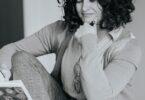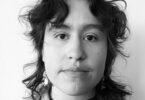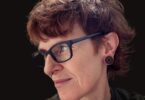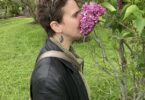I am not hungry, I say. I am not hungry.
I have said it so many times that my mouth is compost and the words are larvae, getting stuck in a craw, spinning wheels in the snow, spewing on the lawn.
It is winter, and the birds are hiding in the trees. I watch them through the places my breath has fogged up the glass, my fingers making shapes like letters of a sonnet only one man can understand, but he won’t have time, before the cold front comes in.
In the clumsy marks, I can still see his face and the careful, to-the-left way he speaks, written in our blood and their blood before us, the blood of the young, the league of our own. The scale click-click-clicks beneath my feet, my toes, wriggling in my shoes (they’re feasting on the compost) he told me to take off and I refused, watching the pounds tick up, up, up, heavier and heavier, like stones I’ve kept in my pocket for the walk to the river.
Ingrown toenails, I say when he reaches for the laces. It’ll make your office smell like rot.
I’m joking, but he doesn’t laugh. He doesn’t say anything to me, but I hear the message he leaves on my father’s answering machine all through the house. There’s something else going on. She isn’t herself…
◊ ◊ ◊
I’ve been home for a while, but I don’t like to go very far, so most days, Lena and I walk just far enough to the nearest plaza, where we stop in at the convenience store. The man at the counter there sells us cigarettes at half price because he says we remind him of his daughters, and we listen to him talk about going home, like it’s both somehow so close and a distant, far away dream. Lena is the nicer one of us, and she leans up against the counter, spider-long fingers clinging to the glass, the bongs on display just below the velvet, red, purple, opulence. My thumbnail digs into the inside of my opposite wrist. Pick, pick, pick.
“Where’s that, again?” she asks, batting her eyelashes that have gone clumpy with the mascara she smuggled out in her sleeve.
“Pakistan,” he says, and her mouth goes hard and sharp, like it does when she’s sad about something.
“Sorry about the floods,” she says, like it would be enough. The snow is falling in a blanket outside, and the radio is talking about an accident somewhere, just off the highway, where tires slid on the ice and spun out, sending the boys into the guardrail, cab crunching like tinfoil in a hard fist. My nail just keeps on digging in, frail body shaking in the jacket.
“It’s alright,” he says.
It’s not.
◊ ◊ ◊
Our legs are pressed up against the bars of the playground, where the rest of it raises out of sand like abscesses in skin, red and swollen, slick with the chill of half-frozen rain. Lena’s getting spit all over the filter of the cigarette, wet and red from the gloss on her fat bottom lip. “When this freezes,” she says, pulling the smoke into her lungs. “Some kid is going to slip, right there on the mat.” I look to where she’s pointing, the rubber laid at the end of the slide. “And their arm is going to snap.”
My vision crosses, blurs. There’s a baby shoe getting weighed down into the sand, and from here, it looks a bit like he’s been buried underground. I lift my phone to my face and take a photo—snap, snap, snap—while Lena talks about all the ways to set a bone. “Let me see,” Lena says when I’m done. I show her the screen. “Nice,” she says. “It looks like one of those billboards on the street.”
She’s right. It’s like I can see it, written in blood in the snow. Choose life, it says, and it’s always a picture of an infant at least six months old. We drive over a pothole, and my teeth rap off the window, bruise. They sink into my tongue, but it’s this body.
Something about being hungry.
It’s forgotten how to bleed.
◊ ◊ ◊
I was always meant to be a part of a pair, but I ate my sister in the womb.
My mother tells this to everyone I meet. “That’s why she has two first names!” she says, laughing, eyes pinching at the corners, skin folding like ribbon unspooling, teeth gnashing at air. I wonder if she sees me like a double image, overlaid, a negative with someone else’s print half-formed on my surface. Milky white, dribbling off my chin, onto an unchanged nappy, feet kicking at the table.
When I open the door to the house, it screams like it is hurting, like I am a hunter and I have driven a knife into its side, like a haunting where the ghost just won’t go home. The absence of Lena at my side feels like a weight that is missing for a void that was never supposed to be empty.
I walk to the kitchen before I even realize where I am going. The basket on the counter is laughing at me, the spaces where the oranges turned foul too early gone soft and damp with rot, but my mother can’t be bothered to throw it out. There’s a spot cleared at the table where I used to sit, my spine pressed flat against the wall. Control what controls you, the doctor would say. You can’t stay inside forever.
I touch the back of the chair. It comes away cold in my hand. When I close my eyes, I am still locked inside. White walls. A pen, clicking against a clipboard. Gum moving around perfect, pearly teeth. Just breathe. Sign here. Take the keys, lock the door. We’re going to teach you what it looks like. Being a body.
Being here.
◊ ◊ ◊
It’s not that I don’t eat at all.
It’s just that I think I’ve swallowed too much, and I keep feeling it under my skin, like hard knots of the people I’ve once been, like lumps in breasts with irregular edges. That’s how you know they’re cancerous, I see myself telling Lena. They don’t move.
“My mum had breast cancer,” Lowry says amiably, blowing at the tea. “Few years back now.”
I stare at the dirt under his fingernails. I know he’s here to watch me, even if I was cleared to come on home. That doesn’t always matter. It’s something about reputation.
I am still not trusted to be on my own.
Lowry’s okay, but he’s kind of a funny guy. One time, his car stalled right outside when Lena and I were smoking in the yard and when we went to help him, we saw his backseat just filled to the brim with boxes of mushrooms, no top, bulbous heads shimmering silver in the light.
“Yeah?” I say. “How’s she doing?”
He lifts his shoulder. “She’s alright, you know, but sick like that changes you.” He flattens his palm over his heart. “Not everything heals back right. She just keeps saying it’s not the same.”
“Isn’t that the truth,” I say. I flip over a card. “Spades,” I say, and his cheek twitches, hard knotted scar under his eye moving with it.
“And Death lays his icy hand on kings,” Lowry quips.
◊ ◊ ◊
When my mother comes home, she gives a sour look to me and Lowry at the table, like this isn’t where she expected us to be.
“You know what time it is?”
I look at the clock on the stove. It’s right there, but I doubt that’s what she’s asking. I wipe the damp of my palms on the sides of my legs.
“She eat?”
Lowry shakes his head, as if to say, I’m just your neighbour, not a social worker. The lines around her mouth get tighter. “You have to eat, Anna.”
Eat. Even the word comes down wrong. The corners of a mouth, pulling up like I’m gearing up to hiss, tongue pulling back so far I’d be afraid of choking on it, fat and heavy like oiled, unseasoned meat.
“My fault,” Lowry says, pushing back, chair scraping along the tile. “We got caught up talking.”
Outside, the car is still rattling where she’s left it idling, burning, like it’s just begging to be put out of its misery, ready to chew up anything we throw into it.
What is it that you want? They kept asking me.
There’d be blood on my lip, and the words would just come on trembling out.
I want a cigarette, but it was so much more than that. I think I am trying to find new ways to say that I am sorry, but I don’t speak that language anymore.
I am not like others. I am exactly who I thought I’d be.
◊ ◊ ◊
Thursday evenings are for the program up in South Hill, where they gather together people that are the same kind of unwell as me. My mother drives me up, because if she didn’t I wouldn’t go, and we both know that.
At some point during all of this she’s stopped talking to me, and instead, fills the car with an absent onslaught of her own mundane commentary. She is looking ahead at the horizon, where the deep grey of the sky is leaking to our windshield, sinking our boots.
I am thinking of a fat little pig roast, skin blistering, peeling off the body.
Bones getting caught in our mouth.
When we pull into the parking lot I sink my teeth into the tender belly of the inside of my cheek. They don’t understand. What is meat but a body? What is the act of not being fed anything but godly?
◊ ◊ ◊
We are breathing but this room is a graveyard and everyone knows it. Where else, I say, would you be able to see this as it is, thin bodies crooked like rakes hung out to dry over sea, blood and bile caked at the corner of our mouths like the worst night of your life in a gift basket, tied up with string? We can’t bear to look at each other the same way we avoid the mirror.
A boy gets up off his folding chair and it screams the whole way up. “Hunger is red,” he says. “And I am consumed with it.”
We murmur our assent. His hair is the colour of straw, leeched out and sallow, his face placid and vague, like numbers on a screen. For a minute, he reminds me of someone.
I am young but I know enough to not look too long. A few months back I read this book, you know, about this plastic surgeon who stopped being able to look at people normal, like once he knew what they looked like on his table, stomach sliced and spread open like butterfly wings, he couldn’t look at them the same. Sometimes I worry it’s going to be like that for me, that I will look too long at these people, decomposing slowly, and only be able to see what’s left of them, scraped out and left to dry on the side of the road like carcasses awaiting vulture mouths.
“Anna,” the social worker says. The corners of her eyes are pinching, folding like an old paper bag. “Do you have anything you’d like to share?”
My tongue is an anvil. Saliva is gathering at the back of my throat, like a dog staring down the barrel of a bone. “No,” I say.
I am lying. This is the nature of feasting.
◊ ◊ ◊
After it ends, we all shuffle to the back courtyard where the awning sags into a covert, black soot marks on the wall from where Charlie grinds out his cigarettes against the brick, and Gianna works at the same notch with her switchblade, scritch-scritch-scritching until it’s a centimetre, two centimetres deep.
“You know if that was someone’s body,” Julia says, sinking deeper into the shroud of her jacket, the burlap canvas hanging off her shoulders, “you’d be reaching bone by now.”
Charlie scowls, perpetual cloud of smoke fanning out ahead of him, making his face hazy and out of focus. I sometimes wonder if he likes it better this way—like how Gianna covers the side of her face when she passes a window, showing off the little peels around her nails where she’s started going after herself. “Do we have to be so fucking morbid all the time?”
No one knows how to answer this question. I certainly don’t.
I stare out at the expanse of field, the waif-tall lemon grass, the dark lines of the transmission towers against the grey-navy of the sky. What is it about death that keeps us crawling slowly toward it? Is such a thing so tart, fat, and wet in our mouths, juices flowing down our chins that we can’t help but stretch, reach for it like The Creation of Adam? Or is it these hands, and all the fumbling, tragic ways it seems to all slip through our fingers like sand, our feet crunching on the glass just below an open window, something whispering at us from the wood, let us in, let us in, let us in?
“Anna,” Charlie says. “You wanna kill this?”
I look down at his hand extended towards me. The burnt end of a cigarette glows between us. It’s the all of us, together.
Ouroboros.
We keep coming back to this.
◊ ◊ ◊
I walk home.
It is not a nice walk, but it’s fresh and cold, and I can feel the walls of my chest expanding with the swelling of my lungs. I take the back way—a long stretch of winding road down the embankment, the places where kids have ridden and lost control of their bikes, bald rubber on their shoes leaving scuff marks on the pavement. I weigh nothing and yet, I am heavy, my feet slapping against the wet pavement, fissures spreading in puddles like cracks in fibreglass.
I make it to the end of the road before my phone starts ringing, shaking in my pocket like I need to roll it on its side, make sure it doesn’t swallow up its tongue.
“Anna,” I say into the speaker, brusque and aloof, and Lena’s laugh fills my ears, husky and unforgiving, that last little intake of air giving something clear, and cold.
“It’s over?” she asks. My fingers slip beneath the collar of my shirt. Scratch, scratch, scratch. There was a time we did this together. All of it—the uncomfortable chairs, the stale coffee, the cigarettes in the yard, the long walk home—before she stopped showing up and I stopped knowing how to ask her to.
“Yeah,” I say.
“Great,” she says back, gum snapping between her teeth. “I’ll meet you at yours.”
Someone goes driving by me. They’re going too fast. Bits of gravel spray me in the legs, cutting up my skin and I can’t help but flinch.
It’s like the nurse, when I first undressed in that hospital room, waiting for the kit to finish processing. How the string had slipped from my hand, the gown, sliding down my shoulder and she’d flinched, her eyes cast down and aside like she was teaching me all the ways to be ashamed of a body.
There’s a droning in my ear, like wasps leaving the nest.
◊ ◊ ◊
“There you are,” Lena says, pushing off the siding. “I thought you’d make me wait out here forever.”
It’s started to snow, and it’s settling on her shoulders, in the hood of her sweater. The dark of her eyelashes. She’s beautiful like this, and it hurts, so I look somewhere else, above her head, at the shadows of the trees, the icicles hanging off the branches like daggers, or diamonds, before they’re pulled from the cave.
“No one said you had to come,” I bite back, my fingers slipping under my cuff to get at my skin. I am too aware of it. The being sewn into of it.
“Come on,” she says, eyes glimmering. “Don’t be like that.” Her hand slides into mine, ice cold fingers pulling mine loose. The nail marks in my wrist sing. The breath burns in my throat. In this minute, I am the act of being alive.
I am also one half something dead and missing. I am aware of this, too.
There’s an owl in the chestnut tree that spans above us, and he watches us from above, his feet curled around the branch.
What do you think he’s trying to tell us? she’ll ask when I point him out. Depends on who you ask, I’ll say. Sometimes death. Sometimes rebirth. Whatever side you want to look at, I guess.
“Let’s go inside,” she says quietly. I watch her little puff of breath come out, merge with the moon. “I’ll make you something to eat.”
I don’t say no. Her hand’s in mine, the warmth of her body pressed to the line of my coat, and the snow is making everything quiet, a little morose. It’s a language, all of its own. I’m hungry. I see you. You’re not alone. When the nurse leaves the room, she’s on the bench outside. She doesn’t mind much that my hands are clumsy, or my breath smells of bourbon. I like this colour on you, she says, calmly, even though her hands are shaking. Cream and robin’s egg blue, and then she ties up the string of the gown.
Nothing’s perfect. I’m hungry, and she’s a dog with a bone.
We touch each other with our wounds first, then our mouths.
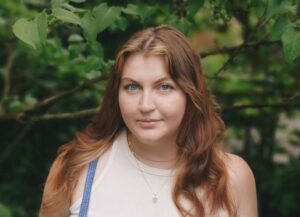 Tessa Swackhammer is a queer contemporary writer from Southern Ontario, with work in Grain Magazine, Sans Press, and others. She has also been a finalist for the Pen Canada New Voices Award, long-listed for the CBC Short Story Prize, and a first-place winner in Storm Cellar’s Flash Majeure Contest.
Tessa Swackhammer is a queer contemporary writer from Southern Ontario, with work in Grain Magazine, Sans Press, and others. She has also been a finalist for the Pen Canada New Voices Award, long-listed for the CBC Short Story Prize, and a first-place winner in Storm Cellar’s Flash Majeure Contest.

